So what's my response? Well, let me begin by agreeing with Nathan: I AM completely wrong about one big thing. I made an elementary error when I calculated the effects of a swing toward Tsai and away from the pan-blue camp: I forgot to divide by two. As a consequence, my forecast violated what I will now forever remember as the First Law of Swing: if one party goes up, some other party must come down (click that link, BTW, it's good stuff.) In hindsight, a really silly mistake. This pretty much sums up my position:
| taiwan_2012_presidential_and_ly_elections_compared_v2.xlsx |
With that mea culpa out of the way, I still think the basic approach here is sound, assuming one does the math right: go down the swing column, take a guess what you think Tsai will get above her 2012 vote share, and that’ll tell you roughly which districts she’ll carry. (Note that by "carry," I mean she'll win a majority over the combined Chu-Soong vote, not just a plurality over Chu.) And if Tsai carries a district, it’s going to be tough for the KMT candidate to hold it.
So, again assuming Taitung reverts to its natural blueness:
- the magic seat number for a DPP is still #41,
- that's still New Taipei 10.
Nathan argues that we should give KMT incumbents at least an extra two points cushion on average (see discussion below). So let's be conservative, do that for all KMT candidates (most of the seats the DPP would have to win are being defended by incumbents anyway), and round up. That means if Tsai wins at least 53% of the presidential vote, then the DPP is likely to have a majority in the LY. She’s currently polling well above 53%, so the DPP is a strong favorite to win a single-party majority.
Thus, I'm actually coming down very close to Nathan's forecast that a Tsai share of the vote somewhere between 53-54% is sufficient to get the DPP to a majority.
I also agree that once Tsai gets much higher than that, the legislative election has the potential to turn into a slaughter. A uniform (big assumption!) 12 point swing toward Tsai (45.63-->57.63%) means she would carry every district all the way down to Hsinchu City, ranked #56 on the list. That would leave the KMT with at most about 17 district seats, which starts to look like the DPP's situation after 2008. (Unlike the DPP, the KMT is cushioned a bit by an advantage in the aborigine seats. But only a bit.)
So, basically, we're in agreement. But that's boring, so let's see if I can find something else to argue with Nathan about.
As Nathan noted, debates are good because they force us to clarify our assumptions and claims and double-check our data. So in that spirit, let me list the key assumptions this forecast rests on (later I'll explore what happens when we relax a couple of these, so don't bug out yet!). They are:
- A1. DPP LY candidates will run close to Tsai in 2016; that is, every DPP candidate's vote share will be approximately the same as Tsai's LY district vote share.
- A2. The percent change in Tsai's vote from 2012 will be uniform across all LY districts.
- A3. The electorate in the presidential election in each district is the same as in the legislative election.*
- A4. The DPP will win 16 non-SMD seats: 16 PR seats and no aborigine seats.
I'll tackle A1 now, and address the rest in separate posts. (Otherwise this post will be book-length by the time I'm done. And the election might already be over!)
A1: Will DPP LY candidates run close to Tsai in 2016?
This assumption can be challenged on at least two fronts: (1) incumbency advantage, and (2) the behavior of disaffected pan-blue voters. Nathan devoted a lot of space to (1), so I'll start with a consideration of that. Here's what I find when I run the numbers again:
- "Incumbency advantage" in Taiwan does exist. Incumbents do better all else equal. Whether that's because they have the resources of office to draw on in elections, or they're better types, we can't say from just these data. It's probably a bit of both. But if you're trying to hold on to a seat, it's better to have the incumbent in the race than the challenger. So I agree with Nathan here.
- Once we look only at DPP-KMT head-to-head races: KMT incumbents ran ahead of Ma Ying-jeou on average in 2012 by about 1.4 points. And DPP incumbents actually ran further ahead of Tsai (+3.5 vs +1.4; Nathan's numbers are +4.5 to +2.2). So incumbents in both parties did systematically better than non-incumbents. I agree with Nathan here, too.
- But the big picture remains the same: relative to the potential swing we're talking about, any advantage the KMT will get from having incumbents running will be small. If Tsai is winning even 55% of the vote, a lot of KMT incumbents are toast even if their DPP opponents are running a couple points behind her. (I think Nathan agrees with this too.)
Now, the data. I initially claimed based on the full set of 73 districts that there wasn't evidence of a KMT "incumbent advantage" in 2012. That is, that KMT LY candidates didn't run significantly ahead of Ma Ying-jeou. Nathan argued quite sensibly that we should look only at those races where the KMT and DPP candidates together got almost all the vote. The question then is, what is "almost all"? Nathan went with 95% of the total vote. I initially went with no single 3rd party candidate winning >5% of the vote, which accounts for some of the discrepancy between us.
I've replicated his analysis with my data, and come up with similar numbers to his, although I find a weaker KMT incumbency advantage than he does (1.4 vs. 2.2 points ahead). The remaining discrepancy appears to be in our coding of incumbents in the head-to-head cases: I have 32 in the KMT, and 12 in the DPP, to 30 and 10 for Nathan. (I pulled my coding from the CEC website, which records party list legislators running in districts as incumbents, and I may have missed a couple of these. So I'd trust Nathan's incumbency coding over mine.) The signs remain the same, though, and so does the conclusion: incumbency provides an electoral benefit, albeit a small one.
Here's the DPP:
Now let's look at the KMT:
Here's what the picture looks like with just the 48 districts where KMT+DPP LY vote > 95%:
Well, yes, if you define this advantage as running significantly ahead of the KMT presidential standard-bearer, Ma. But this is not actually what matters for winning reelection. What the forecast above relies on is the Tsai vote in each district, which is the complement of not just the Ma vote but of Ma+Soong. In other words, I assumed that everyone voting for Soong would also vote for the KMT LY candidate in the district (in the head-to-head contests, I don't this this is crazy). If we add in Soong's 2.77%, then here's roughly what the picture looks like (Soong's 2012 vote varied a lot across districts, too, so this is a simplification):
This is the main point that I tried--clumsily--to communicate in my previous post. Going into this analysis, I had a vague expectation that the KMT majority included quite a few districts that Tsai won in 2012 (that is, where LY vote of KMT > Ma + Soong), suggesting at least a plausible path to survival in this environment. (This stemmed from my own ignorance about 2012, not anything Nathan has written.) That's simply not the case, and unless 2016 is significantly different than 2012, this bodes very poorly for the survival of KMT legislators in districts on the 25-45 range on that list above.
That leads me to the second issue: is 2016 going to be like 2012? Nathan argues that it won't be: the last election was a nearly perfect blue-green head-to-head fight, whereas 2016 will have a lot of disaffected pan-blue voters searching around for alternatives. And some of them will back Tsai, then turn around and vote for pan-blue LY candidates.
Before I make my case for why I don't think this will be a large share of voters, a clarification: my goal here is to establish a baseline expectation for what district vote share DPP candidates will win with a given Tsai presidential vote share. So I'm focusing exclusively on the DPP side of the races. The mess of coordination failures on the pan-blue side is probably going to make this a conservative estimate, but again, I think it's useful to establish a generic partisan baseline first, before we start adjusting up or down, and it's much simpler to do that by starting with the DPP.
Now, to the question about 2016. I expect Tsai's vote share and DPP LY vote shares will again be highly correlated in 2016. We know there are going to be a lot more Tsai supporters in 2016: some will be former or disaffected pan-blue voters, some will be independents, and some will be newly minted voters. Let's rank-order how likely green-blue split-ticket voting should be given the origin of these groups of Tsai voters:
- Disaffected pan-blue voters.
- Independents.
- New voters (i.e. young people aged<24).
First is the shifting partisan identification of the electorate. Nathan wrote a very nice piece for the China Policy Institute blog about the shift in the number of pan-green vs pan-blue partisans over the last couple of years. (If you haven't read it yet, go do it--it's well worth your time.) The takeaway from that piece is that there are a lot fewer pan-blue identifiers now, and a lot more pan-green, than in 2012. How much? Well, instead of a 50-45 advantage in favor of the pan-blue, it's looking more and more from public opinion research like the ratio has flipped toward a green plurality. If we think about 2016 in this light, Tsai's increase in the polls is not entirely a protest vote against Ma and the KMT, but also reflects an increase in identification with the pan-green side of the political spectrum. It's difficult to estimate the size of that increase, but to the extent it's real it should help not just Tsai but DPP LY candidates, too.
Second is turnout. In the current environment, there are a lot of disgruntled pan-blue voters. They're presented with two presidential candidates, Chu and Soong, who aren't eliciting a lot of enthusiasm at this point. In addition, there's the little matter of how Chu ended up heading the KMT ticket: he arranged to have the previous nominee Hung Hsiu-chu dumped, and that angered her supporters within the party. It's not hard to imagine a significant chunk of the pan-blue side simply sitting this election out rather than casting a protest vote for Soong or Tsai. (There's also the matter of travel back from the PRC mainland to vote--it's costly for Taiwanese based there to do this, and the lack of a competitive race for president probably means many more of them will stay away.) If they do that, then those votes won't be there in the LY races either.
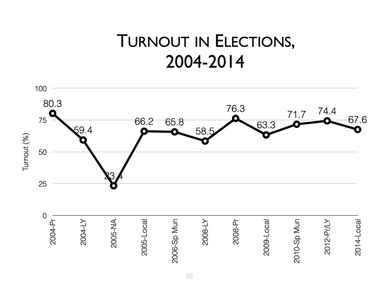
So while 2012 was a nearly perfect blue-green head-to-head contest, it's worth considering also the possibility that the close correlation between the presidential and LY elections that year was not exceptional, but more like a new norm. Like 2012, just about everyone who votes for president in 2016 will also vote for the LY. That means the fluctuation in turnout that we're used to seeing between presidential and LY elections will probably not be as stark going forward, and the likelihood that the presidency and LY will be controlled by different camps, as was true during the Chen Shui-bian era, will be lower from now on. (Note: I haven't looked much at the evidence here, and I'd be very interested to hear Nathan's and others' reactions to this speculation.)
For all these reasons, then, I think assuming a close correlation between Tsai's district vote share and the DPP candidate's in 2016 is a good way to start estimating how the legislative election will play out.
In future posts, I'll say something about the assumptions of a uniform swing, the complicating factor of separate yuanzhumin districts, and the PR seats.

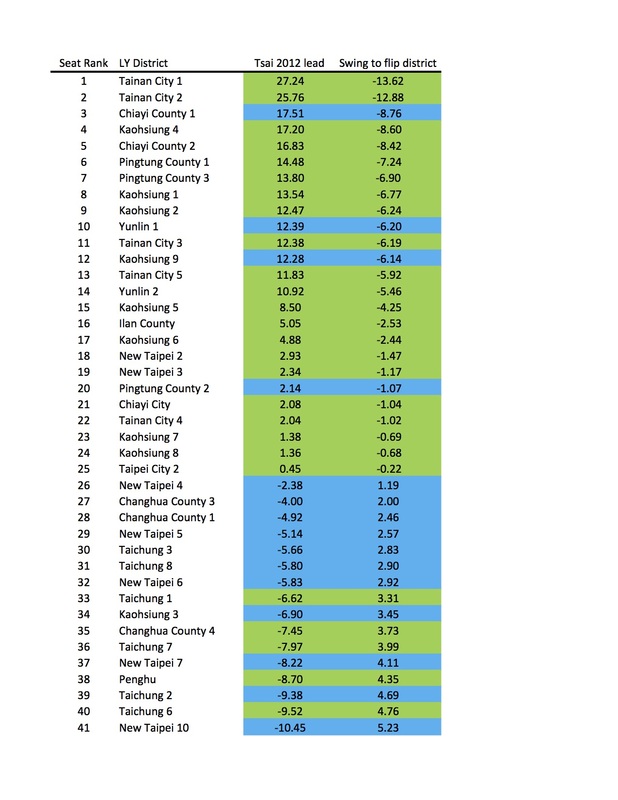
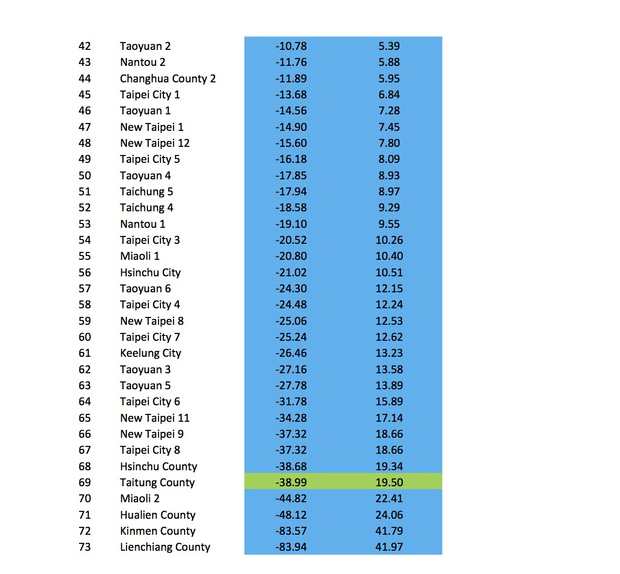
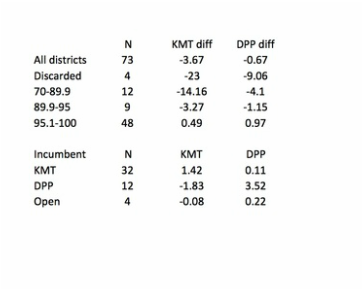
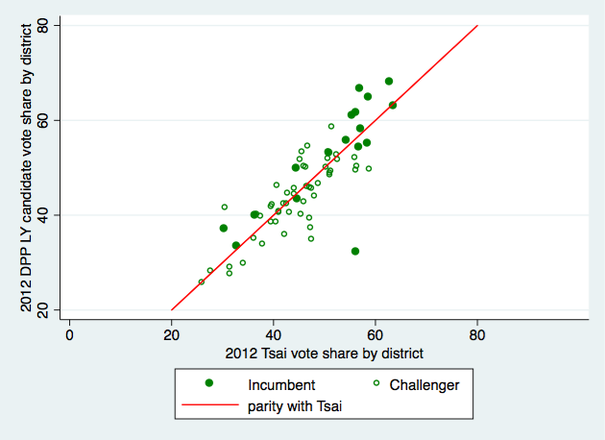
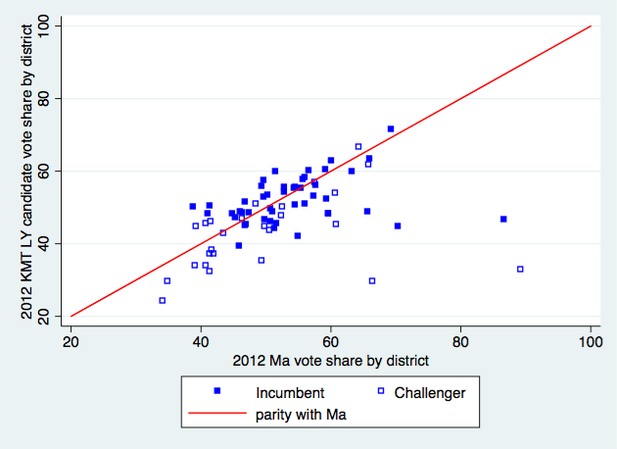
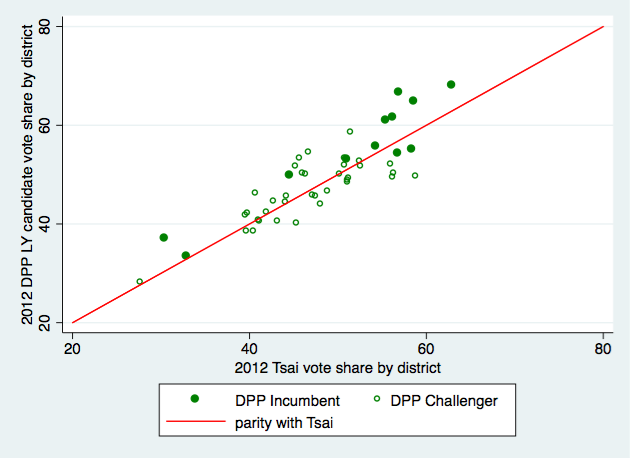
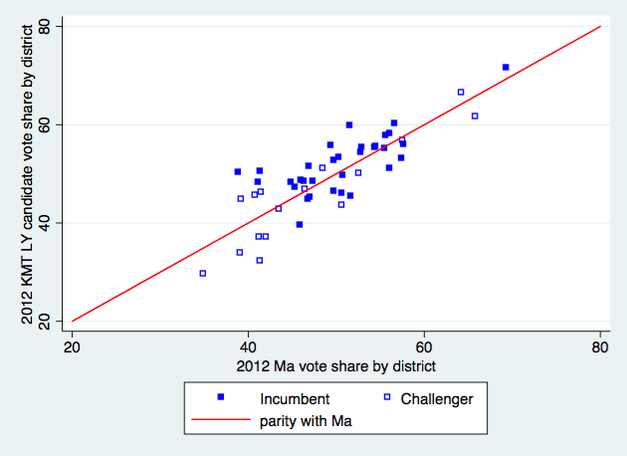
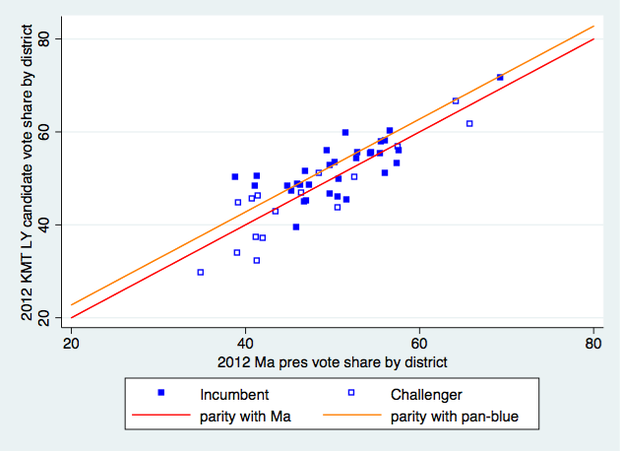
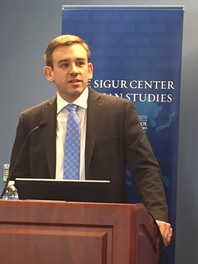
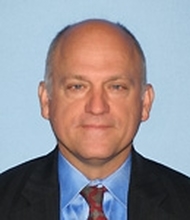
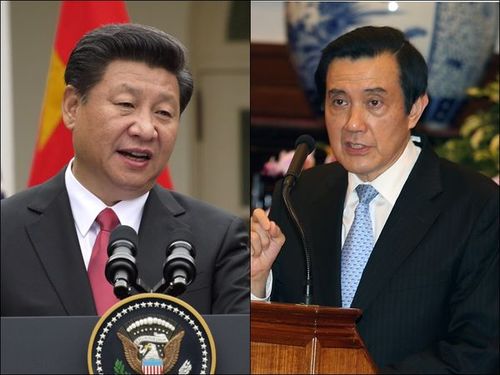
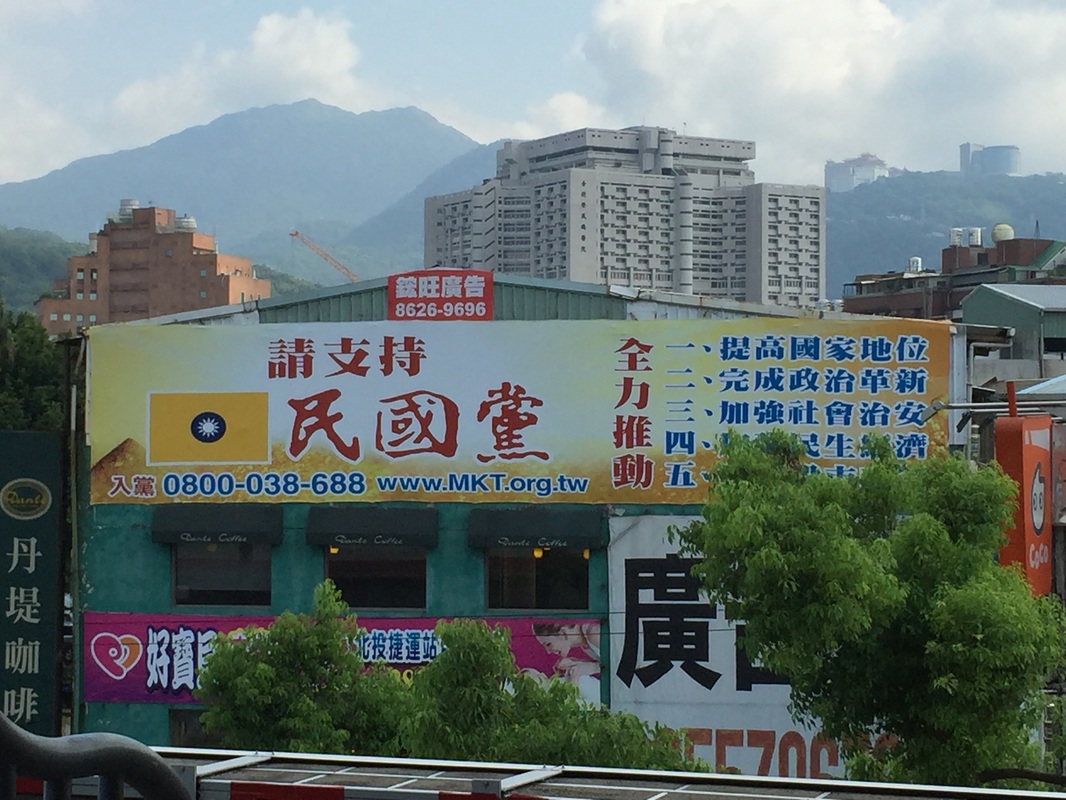
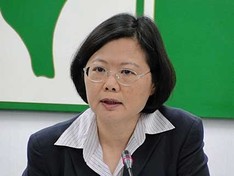
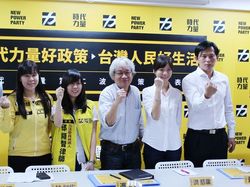
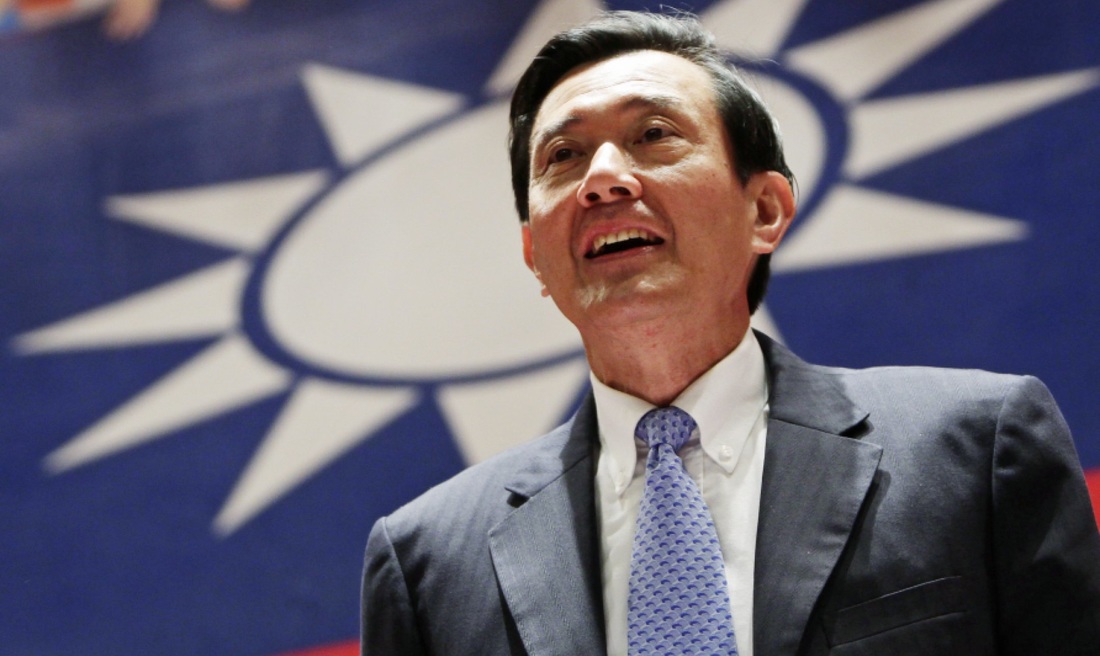
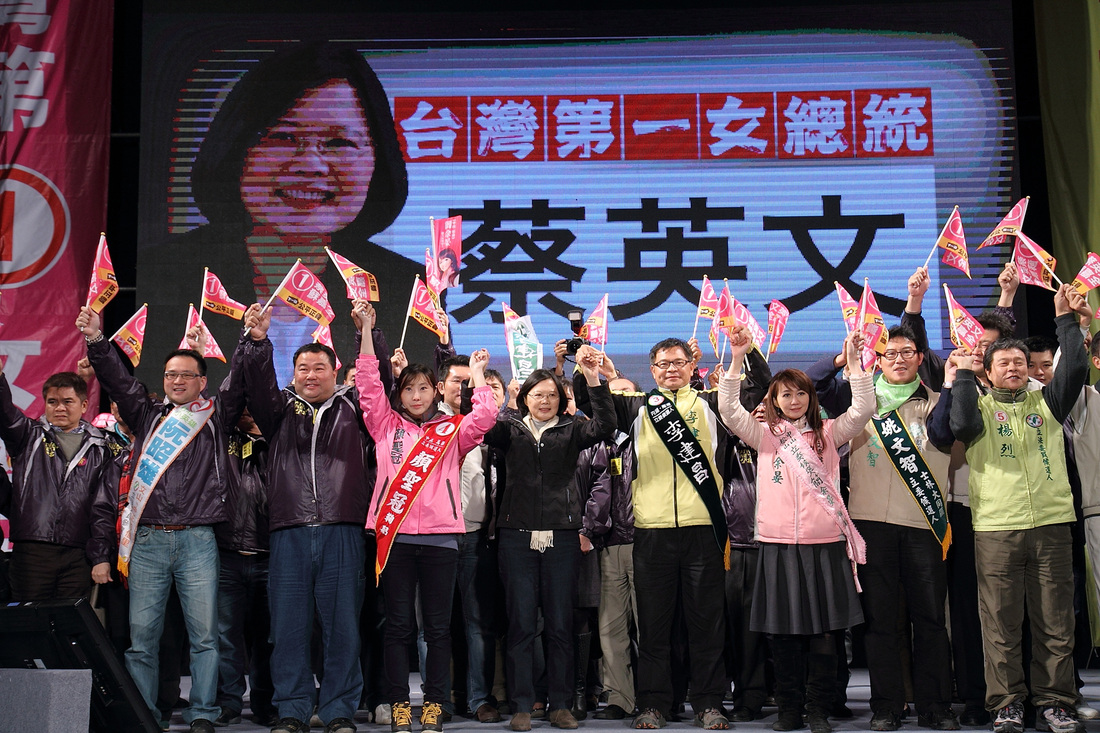
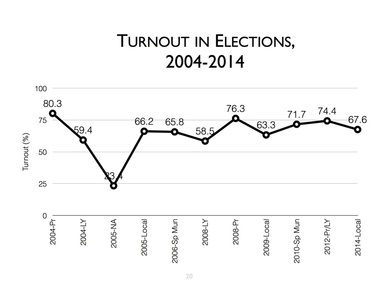
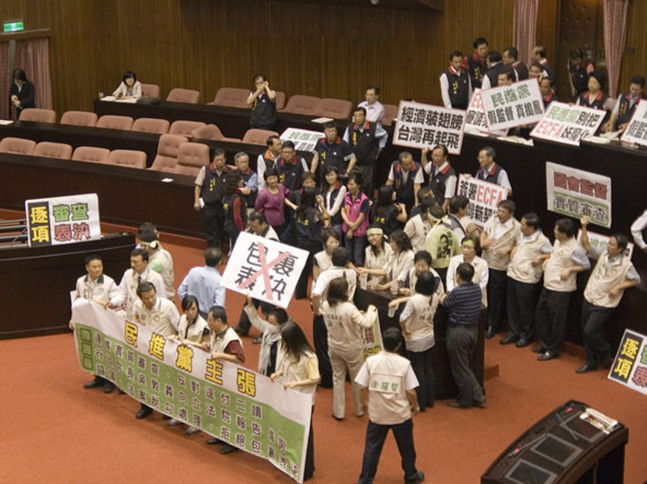
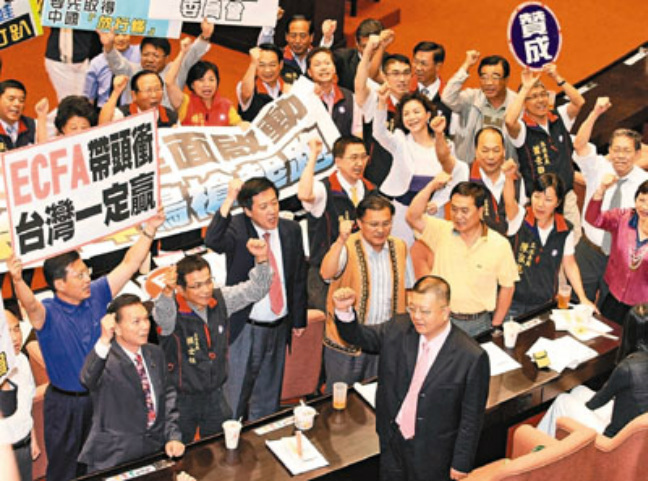
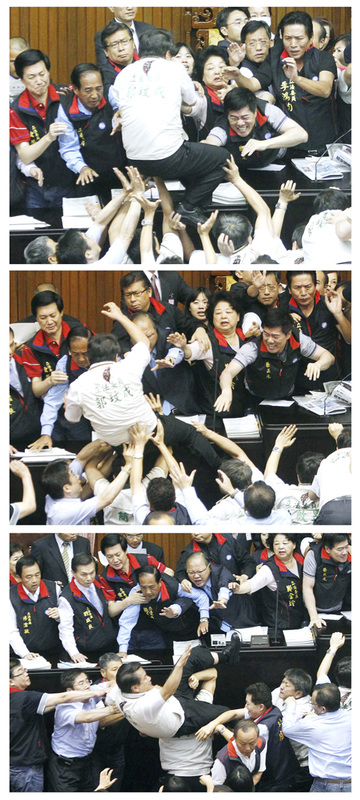
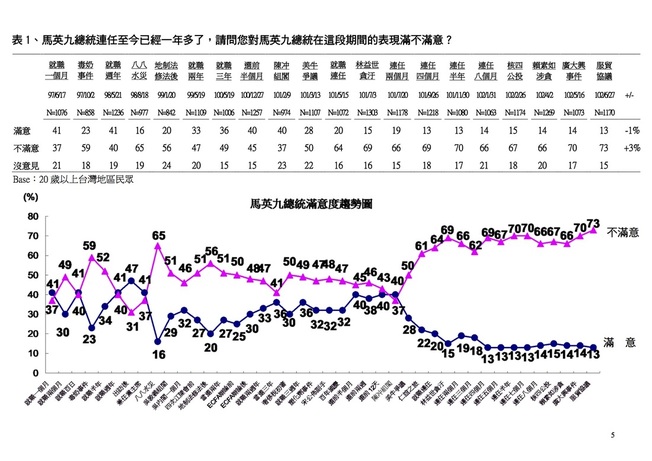
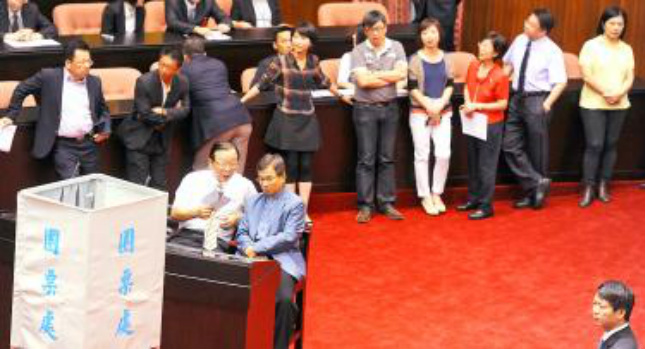
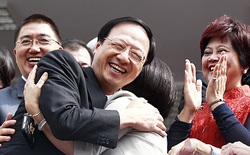
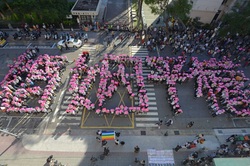
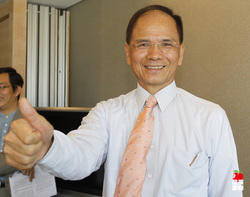
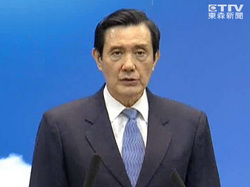
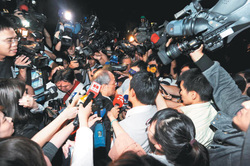
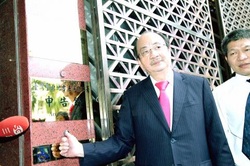
 RSS Feed
RSS Feed
